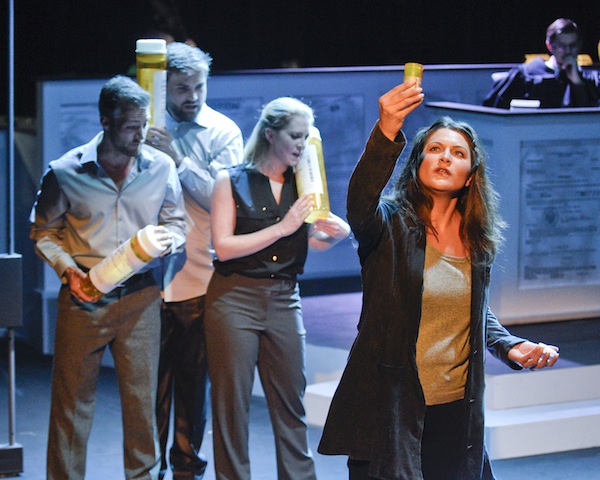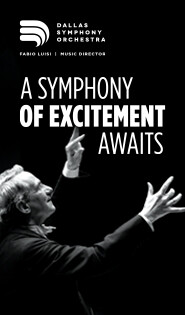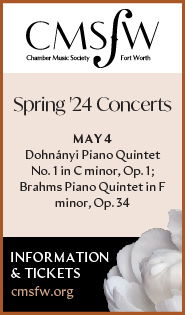Fort Worth Opera premiere makes the case for darkly brilliant “Voir Dire”

Christina Pecce in Matthew Peterson’s “Voir Dire” at Fort Worth Opera. Photo: Karen Almond
On a warm Sunday spring afternoon in Fort Worth a cold chill was provided in the form of the world premiere of Voir Dire, Matthew Peterson’s opera premiered by Fort Worth Opera.
The 90-minute chamber opera, created by Peterson and librettist Jason Zencka, is nothing short of brilliant—presenting a bitter critique—sometimes darkly humorous, often brutal—of American culture, complete with vividly drawn characters and a hauntingly eclectic score.
As one might guess from the title, Voir Dire is a courtroom drama: the title derives from the preliminary hearing phase of the judicial process. More importantly, the title translates directly from its medieval Anglo-French origins as “To speak the truth.”
The picture of our country presented by Voir Dire is hardly an attractive one. The chamber opera is cast in fourteen short scenes, a structure that evokes daytime reality courtroom drama—and, by implication, voyeuristic, low attention-span pop culture. Within that simple, quick-hit setting, Peterson and Zencka have created a compellingly complex dramatic tapestry, impressively weaving together different narratives as well as juxtaposing different moments within the same narrative.
The central recurring story-line centers around a 16-year-old boy who has bludgeoned his mother to death. That tale is introduced in an extended opening recitative, in which a judge (bass-baritone Nate Mattingly) ponders, with much agitation, the sentencing of the boy. In one of many effective dramatic strategies, the boy himself never appears onstage.
In another twist, the audience is handed an immediate reason to sympathize with the invisible homicidal teenager. We learn he was the victim, from an early age, of insidious abuse in the form of “Munchausen Syndrome by Proxy,” in which his mother faked illness in the child, with accompanying inappropriate and unnecessary medication. The audience views the mother being bludgeoned (though the attacker is invisible) and eventually learns that she, too, is a victim of the culture, hungry for approval and admiration.
While all this unfolds, the audience sees and hears the tale of a female drug user seduced and abandoned far from home, two blue-collar females contesting custody of a macaw (who sings a disturbing setting of the Beatitudes), a man who has raped his estranged wife, and a professor of religion who has been charged with possession of child pornography—in other words, American culture at its guilt-ridden, materialistic, misogynist worst.
Soprano Christina Pecce, mezzo-soprano Anna Laurenzo, tenor Andrew Surrena, and baritone Trevor Martin moved smoothly across this ugly cross-section of national life, tackling a huge variety of moods and personalities, ranging from criminals to law enforcement officers, during the opera’s ninety minutes.
The vocal writing aimed at dramatic effect rather than beauty; though given little opportunity to show off traditional operatic virtuosity, the singers were constantly called on to perform wide-ranging, often erratic lines against a dissonant accompaniment, and to produce sounds and timbres outside the traditional range of operatic singing.
Soprano Pecce was particularly memorable as the ghost of the bludgeoned mother, creating, both through her amazing vocal flexibility and dramatic portrayal, a character at once repulsive and sympathetic. Baritone Martin likewise turned in a striking performance as the guilt-ridden, pedophilic professor.
Mezzo-soprano Laurenzo brought power to her moment as the abandoned drug addict in the violently sorrowful aria “I’ve never been this cold before”; tenor Surrena and soprano Pecce achieve a strangely passionate inversion of the traditional love duet as a husband with the ex-wife he has raped. Throughout, the audience is reminded that the people we might easily regard as criminals are human, often motivated by their own unfortunate pasts.
Conductor Viswa Subbaraman held the complex score together with a chamber orchestra of string quartet, keyboards, and percussion stationed behind the singers in the 300-seat studio space. Although largely dissonant and never really lyrical, this music, combined with the profound drama, constantly captivated. The sets by Richard Kagey and James Koehnle—basically a courtroom with judge’s bench—were simple and perfect. And director David Gately created an efficient, gimmick-free but effective performance based on the drama inherent in the text.
Though calling on relative small forces, the work makes considerable demands on the cast and orchestra. However, the rewards are obviously immense, and Voir Dire should find a place with any company looking for a profound, skillfully crafted chamber opera .
Voir Dire will be repeated 7:30 p.m. Tuesday, Sunday and May 6, and 2 p.m. Saturday at McDavid Studio in the Bass Performance Hall complex in Fort Worth. fwopera.org


